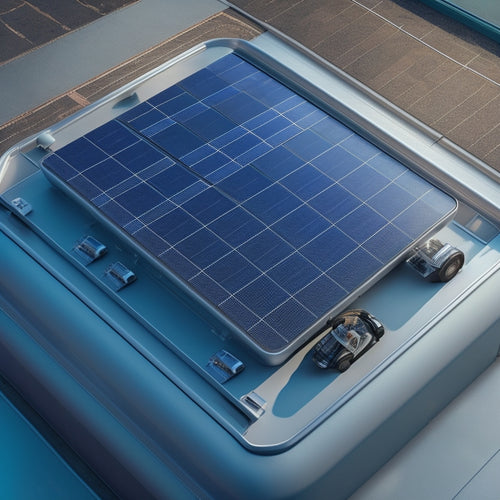
Can I Set Up Solar Energy for My House
Share
You can set up solar energy for your house, but it's essential to assess your home's suitability and understand the costs, installation process, and benefits involved. You'll need to evaluate your roof's orientation, size, and material, as well as identify potential shading obstacles. Initial costs can range from $12,500 to $35,000, but financing options and tax incentives can help offset the expense. With the right panels and installation, you can reduce your reliance on fossil fuels, increase energy independence, and enhance your property value. Now that you've taken the first step, learn how to steer through the process and reap the rewards of solar energy for your home.
Key Takeaways
- Ideal roof orientation and minimal shading are crucial for optimal solar energy production in your home.
- The initial investment for solar energy systems can range from $12,500 to $35,000, but financing options and tax incentives are available.
- Choosing the right solar panels depends on balancing efficiency and cost, with monocrystalline panels offering higher efficiency at a higher cost.
- A site assessment and installation process typically take 1-5 days, and regular maintenance is minimal to ensure peak performance.
- Setting up solar energy for your house can reduce your reliance on fossil fuels, increase energy independence, and even boost your property value.
Is My House Suitable for Solar
When considering solar energy for your home, an essential factor to assess is your house's suitability for solar panels.
You'll need to evaluate your roof's orientation, as a south-facing roof with little to no shading is ideal for maximum energy production. A west- or east-facing roof can still work, but energy output will be lower.
Conduct a shading analysis to identify any obstacles, such as trees, buildings, or chimneys, that could cast shadows on your solar panels. You can use online tools or consult with a solar panel professional to perform this assessment.
The analysis will help determine the best placement for your solar panels and how much energy they can generate.
Additionally, consider your roof's size, material, and condition. A larger roof with a durable, long-lasting material like asphalt shingles or metal can support more solar panels.
If your roof is old or damaged, you may need to replace it before installing solar panels.
Understanding Solar Energy Costs
With solar energy considered a viable option for your home, it's vital to understand the associated costs. The initial investment in a solar energy system can be substantial, but there are ways to make it more affordable. You can investigate solar financing options, such as loans or leases, to spread the cost over time.
Additionally, the government offers tax incentives, like the Solar Investment Tax Credit (ITC), which can help offset the upfront cost by up to 26%.
When calculating the total cost, consider the system's size, quality, and installation complexity. The cost per watt of solar energy typically ranges from $2.50 to $3.50. A typical residential system is around 5-10 kilowatts, putting the total cost between $12,500 and $35,000.
However, with incentives and financing, the net cost can be considerably lower. It's important to research and compare prices from different providers to find the best option for your budget.
Choosing the Right Solar Panels
Since you've determined that solar energy is a viable option for your home, selecting the right solar panels is vital to maximize energy production and minimize costs.
You'll want to take into account the type of panel that best suits your needs. There are two primary panel types: monocrystalline and polycrystalline. Monocrystalline panels are more efficient but also more expensive, while polycrystalline panels are less efficient but more affordable.
Efficiency ratings are also fundamental in determining the right panel for you. Panels with higher efficiency ratings can generate more power per hour of sunlight, but they're typically more expensive.
Look for panels with high efficiency ratings (above 20%) for the best energy production. Additionally, examine the warranty and durability of the panels, as well as their compatibility with your roof type and local building codes.
Installation and Maintenance Process
You've selected the ideal solar panels for your home, now it's time to focus on the installation process. This involves obtaining installation permits from your local government and making certain that your system meets all necessary building codes and regulations.
| Installation Step | Description | Timeframe |
|---|---|---|
| Site assessment and planning | Assess your home's energy needs and plan the installation | 1-3 days |
| Installation of solar panels | Install solar panels on your roof or in your yard | 1-5 days |
| Installation of inverters and mounting | Install inverters and mounting systems for the solar panels | 1-3 days |
| Connection to the grid | Connect your solar energy system to the grid and obtain permission to operate | 1-5 days |
After installation, it's essential to maintain your solar energy system to guarantee peak performance. Create a maintenance schedule to regularly inspect and clean your solar panels, as well as monitor their performance. This will help you identify any potential issues early on and maximize your energy savings.
Benefits of Solar Energy Systems
By utilizing the power of the sun, homeowners can reap numerous benefits from installing solar energy systems.
You'll greatly reduce your reliance on fossil fuels, decreasing your carbon footprint and mitigating your environmental impact. As a result, you'll contribute less to climate change and air pollution, creating a healthier environment for you and your community.
You'll also experience energy independence, no longer being at the mercy of fluctuating energy prices. With solar energy, you'll generate your own power, reducing your electricity bills and saving you money in the long run.
Additionally, solar energy systems require minimal maintenance and can last for up to 30 years or more, making them a reliable and cost-effective option.
Furthermore, installing solar energy systems can increase your property value, making your home more attractive to potential buyers if you decide to sell in the future.
You may also be eligible for tax incentives and rebates, which can help offset the initial installation costs. Overall, investing in solar energy systems is a smart decision that benefits not only your wallet but also the environment.
Frequently Asked Questions
Can I Add Solar Panels to My Existing House?
You're on the right track, cutting to the chase by considering solar panels for your existing house. You can choose from various solar panel types, such as monocrystalline or polycrystalline, and the installation process typically involves evaluating your roof's condition and energy needs.
Will Solar Panels Affect My Roof's Warranty?
When you install solar panels, you'll need to guarantee roof material compatibility; warranty implications vary depending on the manufacturer, so you'll want to review your roof's warranty terms to determine if solar installation will affect its validity.
Can I Sell Excess Energy Back to the Grid?
As you utilize the sun's golden rays, you'll likely generate more power than you need. Luckily, with net metering policies and energy buyback programs, you can sell excess energy back to the grid, offsetting your bills and maximizing your solar investment's ROI.
Do Solar Panels Work During Power Outages?
During power outages, you'll need a battery storage system to keep your lights on, as solar panels alone won't function without a connection to the grid. However, with a battery bank, you can still capture solar energy, albeit with reduced solar panel efficiency.
Are There Any Government Incentives for Solar Energy?
As you envision a sustainable future, you'll be thrilled to know that the government is backing your vision. You'll utilize the power of the sun and reap benefits like federal tax credits and state rebates, making your eco-friendly switch more affordable.
Related Posts
-

Top Solar Panels for Car Battery Maintenance
When selecting top solar panels for car battery maintenance, consider high-efficiency models with high wattage output...
-

10 Best Solar Panel Options for Motorhomes Online
When choosing the best solar panel for your motorhome, consider factors like efficiency, durability, and design. You'...
-

Planning for an Electric Vehicle-Friendly Urban Future
As you plan for an electric vehicle-friendly urban future, you'll need to integrate high-power charging stations, sma...


